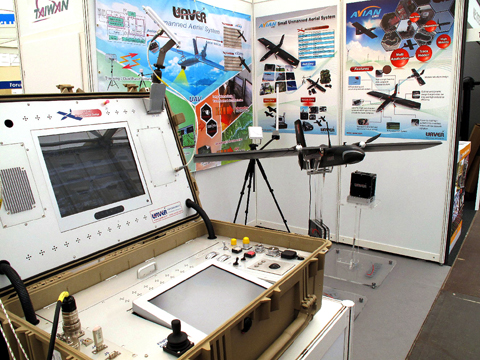With an eye on the vast international aerospace market, Taiwan for the first time opened an exhibition pavilion this year at the Internationale Luftfahrt-Ausstellung (ILA) air show in Berlin.
The Taiwan pavilion is hosted by the Gloria Material Technology Corp (GMTC, 榮剛材料科技), a fabricator of special alloy materials and Carbon-based Technology Inc (CBT, 碳基科技), which designs and produces unmanned aerial systems.
The ILA, held every two years, has been an important event in the European aerospace industry since it first began in 1909.

PHOTO: CNA
About 1,150 exhibitors from 47 countries are attending the exhibition, giving it the largest-ever participation rate. The show, which opened on Tuesday, ends tomorrow.
Hsieh Mei-hua (謝美華), an executive of GMTC’s planning and control center, said the company hoped to use the show to gain a foothold in the global supply chain for the manufacture of Airbus aircraft.
“GMTC will have a bigger chance to become a parts and components supplier to the international aerospace sector by exposing itself in Europe more often and making more contacts with other businesses,” she said.
The company, founded in southern Taiwan in 1988, is the country’s first specialty steel fabricator to engage in the manufacture of special alloy materials. In recent years, it has gained certification from many international aerospace manufacturers and energy producers, including Boeing, Siemens and GE, Hsieh said.
Meanwhile, Taichung City-based CBT’s unmanned aerial system is attracting a lot of attention at the show. CBT chairman Chung Wen-lung (鍾文隆) said he is confident of securing government deals at the show with the system, which includes a 3.45kg electric-powered vehicle with a 90-minute cruising time.
The craft is designed for disaster rescue and military monitoring missions and has the ability to transmit images directly to a ground control center, Chung said.

IN THE AIR: While most companies said they were committed to North American operations, some added that production and costs would depend on the outcome of a US trade probe Leading local contract electronics makers Wistron Corp (緯創), Quanta Computer Inc (廣達), Inventec Corp (英業達) and Compal Electronics Inc (仁寶) are to maintain their North American expansion plans, despite Washington’s 20 percent tariff on Taiwanese goods. Wistron said it has long maintained a presence in the US, while distributing production across Taiwan, North America, Southeast Asia and Europe. The company is in talks with customers to align capacity with their site preferences, a company official told the Taipei Times by telephone on Friday. The company is still in talks with clients over who would bear the tariff costs, with the outcome pending further

NEGOTIATIONS: Semiconductors play an outsized role in Taiwan’s industrial and economic development and are a major driver of the Taiwan-US trade imbalance With US President Donald Trump threatening to impose tariffs on semiconductors, Taiwan is expected to face a significant challenge, as information and communications technology (ICT) products account for more than 70 percent of its exports to the US, Chung-Hua Institution for Economic Research (CIER, 中華經濟研究院) president Lien Hsien-ming (連賢明) said on Friday. Compared with other countries, semiconductors play a disproportionately large role in Taiwan’s industrial and economic development, Lien said. As the sixth-largest contributor to the US trade deficit, Taiwan recorded a US$73.9 billion trade surplus with the US last year — up from US$47.8 billion in 2023 — driven by strong

A proposed 100 percent tariff on chip imports announced by US President Donald Trump could shift more of Taiwan’s semiconductor production overseas, a Taiwan Institute of Economic Research (TIER) researcher said yesterday. Trump’s tariff policy will accelerate the global semiconductor industry’s pace to establish roots in the US, leading to higher supply chain costs and ultimately raising prices of consumer electronics and creating uncertainty for future market demand, Arisa Liu (劉佩真) at the institute’s Taiwan Industry Economics Database said in a telephone interview. Trump’s move signals his intention to "restore the glory of the US semiconductor industry," Liu noted, saying that

AI: Softbank’s stake increases in Nvidia and TSMC reflect Masayoshi Son’s effort to gain a foothold in key nodes of the AI value chain, from chip design to data infrastructure Softbank Group Corp is building up stakes in Nvidia Corp and Taiwan Semiconductor Manufacturing Co (TSMC, 台積電), the latest reflection of founder Masayoshi Son’s focus on the tools and hardware underpinning artificial intelligence (AI). The Japanese technology investor raised its stake in Nvidia to about US$3 billion by the end of March, up from US$1 billion in the prior quarter, regulatory filings showed. It bought about US$330 million worth of TSMC shares and US$170 million in Oracle Corp, they showed. Softbank’s signature Vision Fund has also monetized almost US$2 billion of public and private assets in the first half of this year,